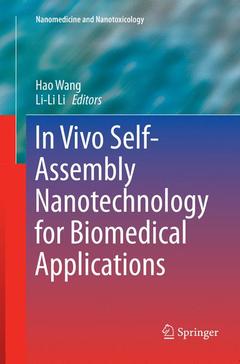Description
In Vivo Self-Assembly Nanotechnology for Biomedical Applications, Softcover reprint of the original 1st ed. 2018
Nanomedicine and Nanotoxicology Series
Language: English
Subjects for In Vivo Self-Assembly Nanotechnology for Biomedical...:
Publication date: 01-2019
Support: Print on demand
Publication date: 04-2018
Support: Print on demand
Description
/li>Contents
/li>Biography
/li>Comment
/li>
This book reviews and discusses the development of self-assembled nanomaterials applied in biomedical fields. Based on self-assembled nanomaterial constructions, it highlights the mechanisms of the stimuli-response-induced assembly/disassembly and transformation. Moreover, it examines healthcare-related diseases, the applications of nanomaterials and therapy/detection strategies, providing readers with both a deeper understanding of the subject and inspirations for future research. The book is primarily intended for researchers and graduate students in the fields of material sciences and chemistry who wish to learn about the principles, methods, mechanisms and biomedical applications of self-assembled nanomaterials.
Prof. Hao Wang received his PhD degree from the Department of Chemistry in Nankai University in 2005. Then he moved to Universät Würzburg in Germany as Alexander von Humboldt (AvH) Fellow from 2006 to 2007 cooperated with Frank Würthner. After that, he joined Hsian-Rong Tseng’s group as the postdoctoral fellow to 2010 and staff research associate to 2011 in department of molecular and medical pharmacology of UCLA. Then, he worked as professor of 100 Talents Program of The Chinese Academy of Sciences in National Center for Nanoscience and Technology of China until now. He has published over 80 papers, including top journals of Adv. Mater., Angew. Chem. Int. Ed. Engl., J. Am. Chem. Soc., ACS Nano and etc. The total citations of the published papers are over 2000 and the obtained funding are over 15,000,000 RMB. His research interests are i) develop supramolecular assemblies in physiological condition; ii) study their bio-effect and further regulate biological behavior; iii) explore supramolecular assemblies based imaging probes and drug delivery systems.
Li-Li Li received her PhD degrees from Beijing University of Chemical Technology in 2012. Thereafter, she joined Prof. Hao Wang’s group of National Center for Nanoscience and Technology as Post Doctor Fellow until 2015. She currently works for Prof. Hao Wang as associate professor at National Center for Nanoscience and Technology in the field of supramolecular nanomaterials for bacterial infection therapy and diagnosis. She was a member of Youth Innovation Promotion Association, CAS.




